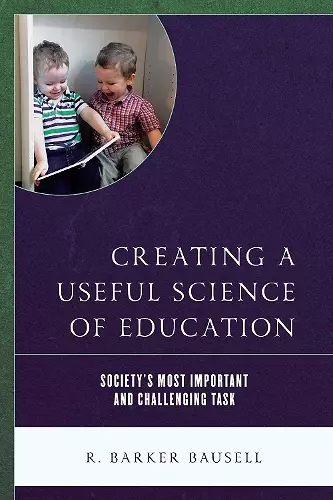Creating a Useful Science of Education
Society’s Most Important and Challenging Task
Format:Hardback
Publisher:Rowman & Littlefield
Published:4th Oct '17
Currently unavailable, and unfortunately no date known when it will be back

Bausell provides a restrictive but defensible view of the purpose of educational research which is to produce instructional, curricular, or assessment products rather than seldom read and soon forgotten academic papers.This book poses and answers two questions: (a) whether it is possible for the science of education to develop into a discipline that could constructively impact the education of students and, if so (b) what type of research would be required for this transformation. Three genres of research were identified that possess the potential for impacting school instruction if the end result of this work is an instructional product capable of increasing learning by increased access to instruction or engagement therewith. Finally, specific suggestions are tendered for creating the infrastructure needed to realize this unique vision of what the science of education should be.
In this exciting new, two-volume trek, Bausell introduces us—with insight and levity—to diverse genres of unproductive research. Happily, he also tosses us several solution strategies to make our schools sparkle. -- Dr. W. James Popham, professor emeritus, UCLA and former president of the American Educational Research Association (AERA)
Dr. Bausell provides an insightful and long overdue summary and critique of educational research, which, in addition to upsetting the status quo, should inform decisions made by academics, professionals, administrators, and policymakers alike. -- Harold Murai, professor emeritus, College of Education, Sacramento State University
Barker Bausell’s orientation toward education research and practice is consistent with his other body of work: careful analysis, removal of poetic distraction from science, with a dash of logical positivism. His desire is not to tear down education research—but rather to help build a better applied scientific foundation. Indeed, various applied sciences are directed by political and financial motives as well as by a desire to understand a topic and, in this case, help people learn better. Sometimes other motives are barriers to improvement. He illustrates misdirected efforts and effective direction, using logic, systematic empirical summary, aspects of philosophy of science, and honesty. -- Steve Sussman, professor, Preventive Medicine, Psychology, and Social Work, University of Southern California
ISBN: 9781475838169
Dimensions: 239mm x 157mm x 16mm
Weight: 372g
152 pages